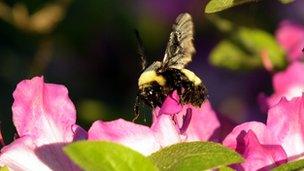Insecticide blamed for bee deaths by Stirling University study
- Published

There is worldwide concern over the plight of the humble bee
Use of a specific group of insecticides is having a serious impact on bumblebee populations, according to a team of Scottish scientists.
The Stirling University researchers found exposure even to low levels of neonicotinoid pesticides had a serious impact on the health of bumblebees.
Bee populations have fallen sharply, and scientists say urgent action is needed to reverse the decline.
Of particular concern is an 85% drop in the number of queens.
That means 85% fewer nests in the following year.
The research found bumblebee colony growth slowed after exposure to the chemicals.
This may partly be to blame for colony collapse disorder, a mysterious phenomenon which has hit large numbers of hives in Europe and North America in recent years.
Professor Dave Goulson, who led the Stirling research, said: "Some bumblebee species have declined hugely. For example in North America, several bumblebee species which used to be common have more or less disappeared from the entire continent. In the UK, three species have gone extinct.
"Bumblebees pollinate many of our crops and wild flowers. The use of neonicotinoid pesticides on flowering crops clearly poses a threat to their health, and urgently needs to be re-evaluated."
Homing systems
Neonicotinoids were introduced in the early 1990s and are now widely used around the world.
The chemicals are nerve agents that spread to the nectar and pollen of flowering plants.
Doses of the pesticides used on crops are not allowed to be lethal to bees, but the evidence suggests there may be significant indirect effects, such as interfering with an insect's ability to navigate.
The UN recently warned that the threat to the honey bee was now a global phenomenon, but despite extensive research the exact causes for declining bee populations are not known.
In a similar experiment, another group of French researchers tracked foraging honeybees and found that the pesticides tripled their chances of dying away from the hive.
The chemical was thought to disrupt the bees' homing systems, causing them to get lost and perish.
The Stirling University research has been published Science magazine.
Environmental group Friends of the Earth called the findings "very significant".
Paul de Zylva, head of the group's Nature and Ecosystems Programme, said: "The bee is a cherished icon of the British countryside and our gardens and is the farmer's friend that helps pollinate our food crops so we cannot afford further decline.
"We now need the Government to look seriously at the emerging evidence from here and other countries and consider whether neonicotinoid pesticides should continue to be used freely in the UK."
- Published31 January 2012